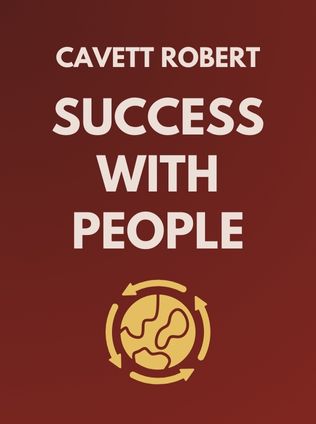
Success with People
Your Action Plan for Prosperity and Success
By Cavett Robert
Published 11/2018
About the Author
Cavett Robert, an esteemed figure in the realm of professional speaking, is renowned for his profound influence on public communication. Born in 1907, Robert embarked on a diverse career path that included law, insurance, and real estate. His academic journey saw him graduate from Ole Miss in 1929 and later earn a law degree from Washington and Lee University. Initially practicing law in New York, he eventually moved to Arizona in 1937, where he made significant strides as a lawyer and salesman. However, it was in his sixties that Robert discovered his true passion for public speaking. His late bloom in this field did not hinder his success; instead, it propelled him to establish the National Speakers Association in 1973, a milestone that solidified his legacy in the industry. Robert's expertise and contributions were recognized with the prestigious Golden Gavel Award from Toastmasters International in 1972, acknowledging his excellence in public speaking and his dedication to the craft.
Robert's teachings, particularly encapsulated in his book "Success with People," emphasize the critical role of interpersonal skills in achieving success. His work delves into the concept of human engineering, a term he uses to describe the art and science of understanding and influencing people. Robert's insights are not merely theoretical; they are grounded in his extensive personal and professional experiences. His teachings are designed to be universally applicable, offering valuable guidance for anyone looking to improve their communication skills, build stronger relationships, and achieve greater success in life.
Main Idea
"Success with People" centers around the concept of human engineering, which Cavett Robert defines as the science of understanding and influencing people's behavior. The book posits that the cornerstone of personal and professional success lies in one's ability to connect with others effectively. Robert introduces six fundamental principles of human engineering that are designed to help individuals navigate social interactions, improve their communication skills, and build more meaningful relationships.
These principles are not confined to the realm of business or sales; they are applicable in all aspects of life where interpersonal interactions play a crucial role. Robert's approach emphasizes the importance of understanding others' perspectives, motivations, and needs. By mastering these principles, individuals can enhance their influence, foster better relationships, and ultimately achieve their goals. The book serves as a comprehensive guide to mastering the nuances of human interaction, offering practical strategies and insights that can be applied in various contexts.
Table of Contents
- Introduction
- Principle #1: People Love To Buy But They Hate To Be Sold
- Principle #2: We First Must Sell Ourselves
- Principle #3: People Are Persuaded Not By What We Say But By What They Understand
- Principle #4: How Does It Benefit Me –– Not You, But Me?
- Principle #5: Wants, Not Needs, Cause People To Act
- Principle #6: Emotion Opens The Door But Logic Locks It Tightly
- Conclusion
Principle #1: People Love To Buy But They Hate To Be Sold
In the first principle, Cavett Robert delves into the psychology behind buying behavior. He asserts that people inherently enjoy the act of buying because it gives them a sense of control and fulfillment. However, there is a fine line between enjoying the buying process and feeling pressured by a sales pitch. Robert argues that people resist being sold to, especially when they perceive the salesperson as pushy or manipulative. This principle is crucial for understanding consumer behavior, as it highlights the importance of creating a positive buying experience.
To foster a conducive buying environment, Robert suggests that sellers should focus on making the customer feel important and respected. He introduces the concept of the "buying mood," which he describes as a state where the customer feels optimistic and valued. Creating this mood involves treating the customer with respect, listening to their needs, and providing them with the information they need to make an informed decision. By doing so, sellers can reduce resistance and increase the likelihood of a successful sale.
Sign up for FREE and get access to 1,400+ books summaries.
You May Also Like
The Subtle Art of Not Giving a F*ck
A Counterintuitive Approach to Living a Good Life
By Mark MansonRich Dad Poor Dad
What the Rich Teach Their Kids About Money - That the Poor and Middle Class Do Not!
By Robert T. KiyosakiHow To Win Friends and Influence People
The All-Time Classic Manual Of People Skills
By Dale CarnegieFreakonomics
A Rogue Economist Explores the Hidden Side of Everything
By Steven D. Levitt and Stephen J. Dubner



















